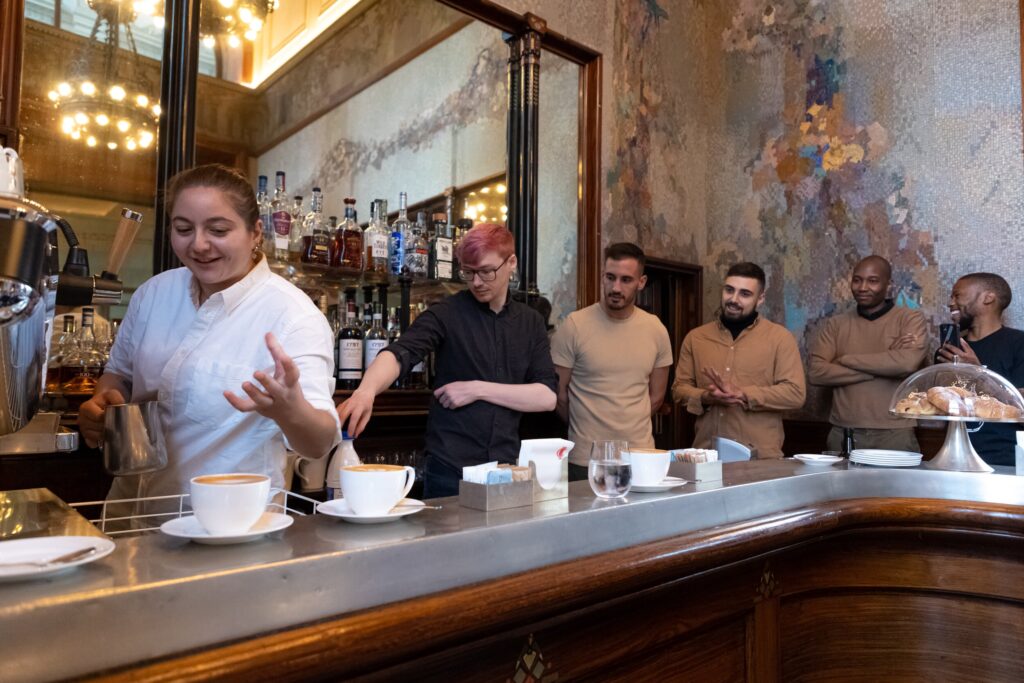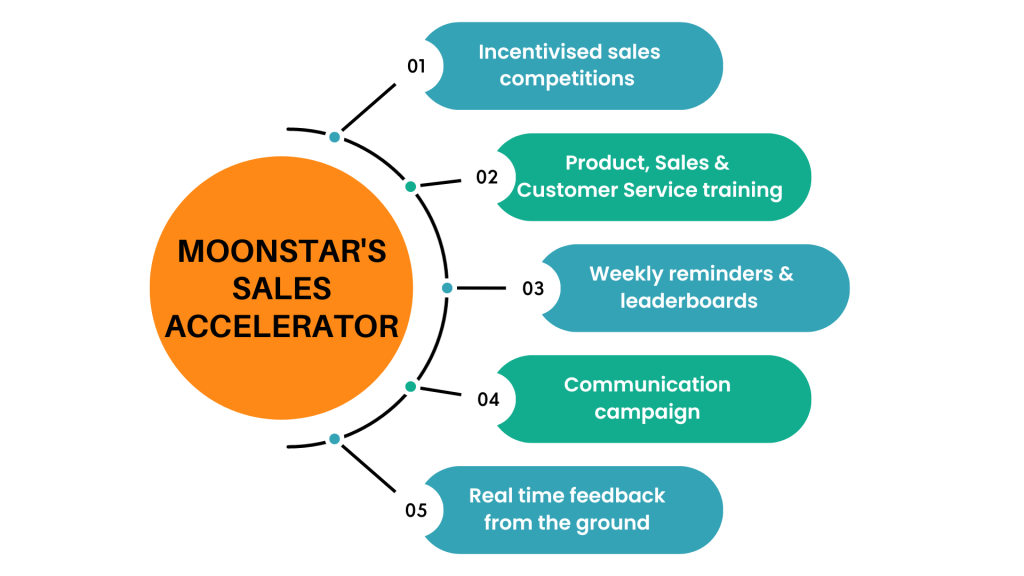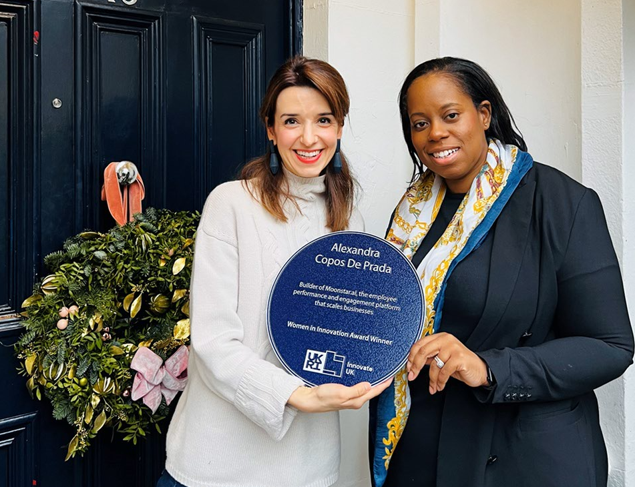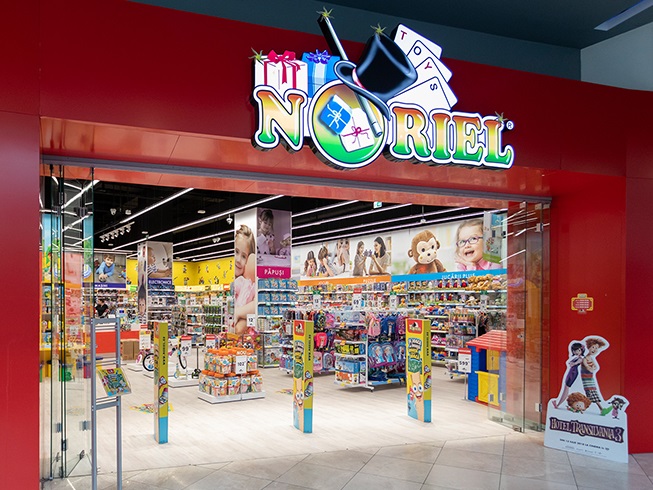The ultimate guide to running sales competitions in retail for frontline workers

Nudges to Engage: 3 Expert Tips to Increase Employee Engagement for Retail Frontline Teams
August 8, 2023
Moonstar’s Founder, Alexandra Copos de Prada, Celebrates Women in Innovation with the Unveiling of a Purple Plaque
January 9, 2024In the highly competitive world of retail, the difference between success and stagnation often boils down to one critical factor: the performance of your frontline workers. As the first point of contact with your customers, these dedicated employees have the power to transform the shopping experience, drive sales, and build brand loyalty. Yet, tapping into their full potential can be a challenge.
Sales competitions for frontline retail workers can be the catalyst for unleashing their true potential. Harnessing the inherent drive and competitiveness of your frontline team can significantly uplift your retail outcomes. Sales competitions, when strategically implemented, not only motivate employees but also cultivate an atmosphere of camaraderie, learning, and excellence. In this guide, we delve deep into the mechanics of effectively running such competitions, drawing from industry best practices and Moonstar’s expert insights.
Discover how you can empower your team, foster customer relationships, and ultimately, elevate your retail sales game to new heights. Welcome to your comprehensive roadmap for sales competition success.
The Importance of Frontline Workers in Driving Business Performance
The success of a retail business largely depends on the performance of its frontline workers. These employees, who directly interact with customers, have a significant influence on sales and customer satisfaction. Their product knowledge, customer service skills, and motivation can make or break a sale.
According to Gallup, highly engaged teams can increase profitability by an impressive 22% and their productivity by 17%, while research by PwC shows that companies that invest in and deliver superior experiences to their employees and customers are able to charge a premium of as much as 16% for their products and services.
These statistics highlight the importance of cultivating a motivated and skilled frontline workforce. When your employees are engaged and empowered, they can deliver exceptional customer service, drive sales, and contribute to your bottom line.
Engaging your frontline workers goes beyond merely increasing sales. It’s about creating a work environment where employees feel valued, motivated, and equipped to excel in their roles. When your workforce feels invested in your brand, they naturally become more proactive in providing excellent customer service, upselling products, and acting as ambassadors of your brand.
What are the challenges posed by frontline employees?
Retailers are well aware of the potential held within their frontline workforce. However, tapping into this potential can prove to be a significant challenge. Several factors can hinder the effectiveness of your retail staff, including lack of training, low motivation, and insufficient engagement with your company and team.
1. Lack of Training
Proper product knowledge and customer service skills are crucial for successful sales. Your employees must be knowledgeable about your products and how to engage with your customers to confidently communicate your products’ benefits to them. Without adequate training, they may struggle to answer questions, provide useful information, or make effective recommendations, leading to missed sales opportunities.
2. Low Motivation
A motivated employee is more likely to go the extra mile to make a sale. However, motivation can wane due to factors such as lack of recognition, monotonous or too complex work, or insufficient incentives. When employees lack motivation, their performance suffers, leading to lower sales and a decrease in customer satisfaction.
3. Insufficient Engagement
Engaged employees feel a strong connection to your brand and are more likely to act as enthusiastic ambassadors, as exemplified by the CHRO of Starwood Hotels, Jeff Cava, and his relentless focus on linking employee engagement to customer satisfaction. In contrast, disengaged employees may have a negative impact on customer perception, brand reputation, and overall sales.
Retailers often struggle with these challenges, missing out on the potential profits and benefits that a motivated and skilled frontline workforce can bring.
It is easy to focus on external factors such as market trends, competition, and customer preferences, while overlooking the power of the people you already have employed in your business and who can significantly influence sales.
The key to overcoming these challenges lies in investing in your people. Sales competitions, done properly, can act as a catalyst for employee engagement, proper training and a motivating and fun work environment. Here are a few tried and tested ideas on how you can build great sales competitions in your company.
Ideas for Great Sales Competitions in Retail or Food & Beverage Outlets
Sales competitions are a proven method to motivate and engage your frontline workers. By introducing a competitive element and attaching tangible rewards to high performance, you can create an atmosphere of excitement and drive among your employees. Below are some ideas to inspire you to run effective sales competitions:
1. “Product of the Week” Challenge
This competition can be used to promote new products, clear out old inventory, or boost sales of a particular product. Employees compete to sell the most of a designated “Product of the Week”.
For example, a European toy retailer partnered with Moonstar using Moonstar’s Sales Accelerator to revamp their “Product of the Week” competition, resulting in a 14% sales increase in participating stores over two months. Moonstar’s Retail Sales Accelerator is a comprehensive solution designed to address the challenges faced by retailers in tapping into the full potential of their frontline workforce. With its five powerful pillars of incentivized sales competitions, comprehensive product and customer service training, weekly progress leaderboards, energizing communication campaigns, and real-time feedback from the ground, it provides retailers with a proven strategy to fuel engagement and productivity.
2. “Sales Marathon”
This long-term competition encourages employees to accumulate sales points over a specific period, such as a month. Milestone rewards can be given along the way, and a grand prize can be awarded to the top seller at the end of the competition period. This format can encourage sustained effort and focus throughout the competition duration.
Luxottica, the largest global eyewear company, has two large yearly campaigns, during the Christmas and Summer seasons in which they run a sales marathon over two months. They brand their campaigns (the one in Summer 2023 followed the British Coronation theme), communicate these extensively in a fun tone of voice and offer extra perks to employees, as compared to their monthly sales bonus schemes. For example, they double the points an employee receives for their sales for one week only, or offer an extra incentive to the store with the highest growth rate for a specific week.
3. “Up-Selling/Cross-Selling” Competition
Encourage your employees to up-sell or cross-sell related products to increase the average transaction value. In a restaurant setting, employees could be rewarded for selling appetizers, desserts, or beverage pairings with meals. This approach not only boosts sales but also enhances the customer experience.
For example, Best Buy, an electronics retailer, incentivizes its employees to compete to sell certain products or achieve specific sales goals. For instance, Best Buy has run sales competitions focused on selling extended warranties, accessories, or services like their Geek Squad protection plans. Leaderboards, regular updates, and recognition for top sellers are commonly used to motivate the sales team.
4. “Add-On Sales” Contest
In a retail setting, employees can compete to sell add-on items like accessories, extended warranties, or complementary products.
For example, in a clothing store, employees could be incentivized to sell matching accessories with outfits. This competition format can increase overall transaction value and promote complementary products.
5. “Customer Loyalty” Race
Reward employees for signing up the most customers for a loyalty program or newsletter. This competition format can help increase customer retention and repeat business. Loyal customers are more likely to make repeat purchases, refer others, and provide valuable feedback.
Target, for example, has used a tactic called “REDcard Rumble,” a competition where stores compete against each other to see who can get the most customers to sign up for Target’s REDcard loyalty program. Employees are motivated to promote the program, and the winning stores receive recognition.
6. “Team vs. Team” Face-off
Divide your employees into teams and have them compete against each other for collective sales goals. This approach fosters team collaboration and can be particularly effective in larger retail or food & beverage outlets where teamwork is essential.
For example, McDonald’s has run competitions called “Crew Challenges” where frontline teams compete against other stores in their region on metrics like speed of service, order accuracy, and customer satisfaction. It fosters a sense of team pride and encourages employees to excel in their roles.
7. “Skill Mastery Showdown”
Challenge employees to showcase their expertise and mastery in specific tasks or roles within the business. This competition format not only drives excellence in service delivery but also promotes ongoing skill development. Participants strive to perfect their craft, leading to better customer experiences, improved product or service quality, and a culture of continuous learning and improvement.

For example, Starbucks has a “Barista Championship” where baristas from different regions compete against each other in various categories, such as latte art, coffee tasting, and customer service. A separate category focuses on product innovation where Baristas bring their own ideas to life. This is a great way to use the collective know-how of your employees, who engage with clients day in and out, to uncover new products with great client traction. It’s a great way to motivate employees to improve their skills, celebrate those who go above and beyond.
How to Run Successful Sales Competitions for Frontline Workers
The key to successful sales competitions lies in thoughtful planning and execution. Here are five crucial steps to consider:
1. Setting Clear Goals and Objectives: Before starting any competition, it is essential to establish clear goals and objectives. Whether you are looking to boost sales of a specific product, increase overall sales, or sign up more customers to your loyalty program, your competition should be designed to achieve these goals.
2. Defining the Rewards for Winners: Offer attractive and meaningful rewards for competition winners. This could be monetary bonuses, gift cards, exclusive experiences, and definitely recognition within the company.
3. Creating Fair and Transparent Competition Rules: Make sure that the competition rules are fair and transparent. All participants should have an equal chance of winning, and the rules should be clearly communicated to everyone involved.
4. Regularly Updating and Communicating Leaderboards: Regularly updating and communicating leaderboards (weekly at least) can help sustain motivation throughout the competition. This can also create a sense of urgency and drive as participants can see where they stand compared to their peers.
5. Recognizing and Celebrating Winners: After the competition ends, it is essential to recognize and celebrate the winners. This not only rewards their efforts but also motivates others to perform better in future competitions.
Moonstar’s Retail Sales Accelerator, a Proven Solution to Increase Retail Sales and Motivate Your Frontline Workforce
At Moonstar, we understand the importance of empowering your frontline workforce to become more than just employees. We believe in transforming them into motivated, skilled, and passionate ambassadors of your brand. Our mission is to help retailers increase their revenues by building a more productive, engaged, and motivated workforce. Moonstar’s Retail Sales Accelerator aims to transform the way you approach sales competitions.
The Retail Sales Accelerator is built on five powerful pillars, which, when combined, create a comprehensive strategy for increasing sales and transforming your retail teams into exceptional salespeople and brand ambassadors. Here are Moonstar’s Sales Accelerator’s five pillars.

1. Incentivized Sales Competitions
Tapping into employees’ competitive spirit can significantly boost sales. The Retail Sales Accelerator creates sales competitions with attractive incentives for high performance, encouraging employees to excel in their sales efforts.
2. Product, Sales & Customer Service Training
Your employees need to have a solid grasp of your product portfolio and how to communicate its benefits to potential customers. Comprehensive training ensures that your teams can become trusted advisors to customers, helping them make informed decisions and closing sales faster.
3. Weekly Reminders & Leaderboards
Regular communication is key to keeping your teams motivated. The Retail Sales Accelerator provides weekly reminders and leaderboards to keep your teams accountable for their progress and to encourage their competitive spirit.
4. Communication Campaign
An energizing communication campaign can keep your teams excited and engaged with the sales competition. This includes regular updates, motivational messaging, and tips for success.
5. Real-Time Feedback from the Ground
Your frontline employees are in the best position to give you insights on client trends and best practices. The Retail Sales Accelerator leverages this feedback, recognizing outstanding performers as Sales Ambassadors and allowing them to share their successful strategies with their peers.
The Bottom Line on Running Sales Competitions for Retailers
Running sales competitions can offer numerous benefits to retailers, including increased sales, better customer service, and higher employee engagement. One of the most significant advantages is the potential for a tangible increase in sales, as was the case with one of Moonstar’s clients, a large European toy retailer that achieved a 14% sales increase using Moonstar’s Sales Accelerator approach. Additionally, sales competitions can lead to better customer satisfaction, as more knowledgeable and motivated employees are better equipped to assist customers in their buying journey. Furthermore, a competitive and rewarding environment can significantly boost employee morale and engagement, leading to a more positive work atmosphere.
By focusing on training, motivation, and engagement of their frontline teams, retailers can tap into the full potential of their workforce, leading to greater profitability and enduring brand loyalty. Frontline employees hold the keys to significant sales growth and heightened brand reputation, and with the right tools and strategies, retailers can transform this vital force into a powerhouse of consistent performance and motivation.
Moonstar’s Retail Sales Accelerator is a comprehensive solution designed to address the challenges faced by retailers in tapping into the full potential of their frontline workforce. Through its five cornerstone elements — incentivized sales contests, in-depth product and customer service training, weekly performance leaderboards, dynamic communication campaigns, and instant feedback mechanisms — it presents retailers with a tried-and-true blueprint to fuel team engagement and efficiency.
Wait, what’s Moonstar again?
Moonstar.ai helps companies grow their business by building a more engaged, productive and happier workforce. We do this by integrating the main tools companies need to develop their teams: company communication, onboarding and development, pulse checks and nudges. Backed by Innovate UK and Harvard’s Innovation Labs.




